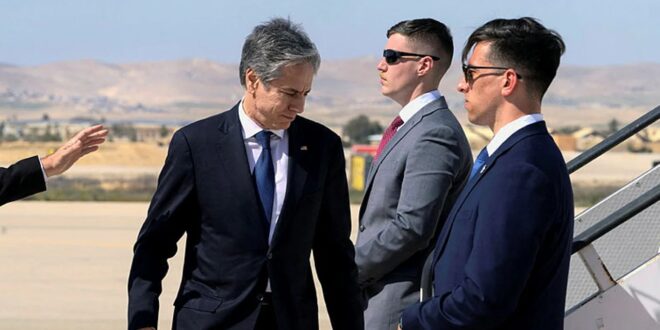After attending Israel’s Mideast summit, Blinken will meet with the UAE leader to discuss Iran and global energy markets in the face of high crude prices
U.S. Secretary of State Antony Blinken will meet the de facto ruler of the United Arab Emirates in Morocco on Tuesday in a bid to ease disagreements with Washington’s traditional Gulf allies over oil, Iran and the Ukraine crisis.
The meeting with Abu Dhabi Crown Prince Sheikh Mohammed bin Zayed al-Nahyan will be his most important during a regional trip that unusually for a secretary of state did not include any stops in Gulf monarchies or talks with Saudi officials.
Washington’s Arab allies chafe at what they see as declining U.S. commitment to security in their region in the face of Iranian involvement in Yemen, Iraq, Syria and Lebanon which has nudged them into common cause with former arch-foe Israel.
Blinken over the weekend attended a summit between Israel and Arab countries with which it has agreed peace, including the UAE and Morocco, but he has not met any senior Saudis.
Though the United States is focused long-term on the strategic challenge of growing Chinese influence, and its attention now is on the Ukraine crisis, very high crude prices have underscored the continued relevance of Gulf oil producers.
Blinken is expected to stress the importance of both the UAE and Saudi Arabia in his talks with Sheikh Mohammed, discussing Iran, Yemen, global energy markets and the UAE’s rapprochement with Syria, U.S. officials said.
In return, he is seeking to overcome Gulf resistance to a U.S. request to raise oil output to tame rampant crude prices that have aggravated high inflation rates globally.
“The United States is a very important partner for all of us and we are very proud of the relationship. I think what we need is pragmatism. We need to look at the objective of the energy and what we’re asking for is not to tell us ‘do this’ or ‘do that’,” said UAE Energy Minister Suhail al-Mazrouei on Tuesday.
Ukraine assistance
Meanwhile, Washington wants its Arab allies to take a stronger stance against Russia by voting with the United States in the United Nations, joining Western sanctions or even sending security assistance to Ukraine.
The UAE abstained in a UN security council vote on Ukraine last month and Morocco did not show up for a general assembly vote. The UAE and Saudi Arabia both have increasingly important energy ties with Russia.
“Energy is coming back as a major component of many of the Middle East and, indeed, world discussions. What people thought was the death of fossil fuels is, I think, a little bit premature,” senior Emirati official Anwar Gargash said on Tuesday.
Gulf states have for years been frustrated at what they see as U.S. inaction in confronting Iran’s role in the region, but their concerns have grown since Joe Biden became president.
They are worried about the impact of a potential new nuclear deal with Iran and annoyed that Washington has ended its support for their war in Yemen, put new conditions on weapons sales to Gulf states and criticized their human rights records.
Blinken is expected to reassure Sheikh Mohammed on Washington’s commitment to stopping Iran obtaining a nuclear weapon amid a series of missile attacks by the Tehran-backed Houthi group in Yemen.
Both Saudi Arabia and the UAE, concerned that Washington’s push for a deal over Iran’s nuclear program will not tackle its development of missiles or the role of its regional proxies, have moved to engage with Tehran directly.
“We need to turn the page… reaching out to various friends, of course, but adversaries also,” said Gargash, who was speaking at the World Government Summit in Dubai.
 Eurasia Press & News
Eurasia Press & News




